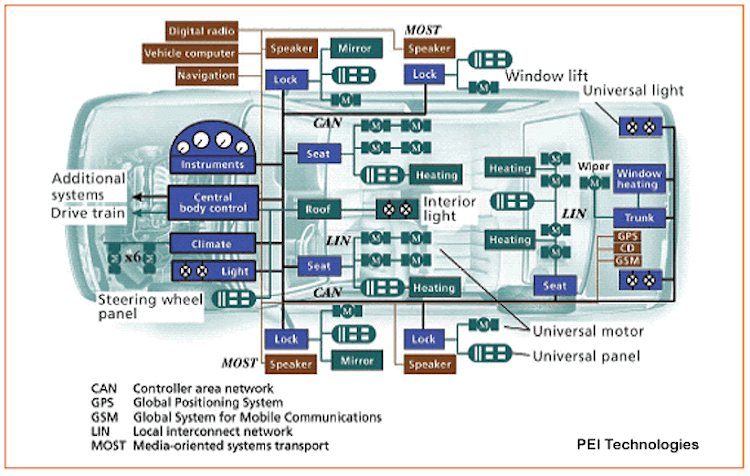
Swisys adopts twin-track route to progress with networks for machines
Taiwanese automotive electronics and communications solution provider Swisys has adopted a twin-track approach to the development of company and its technologies.
The company, which was founded in 2016 by a professor at Southern Taiwan University of Science and Technology and a team of electrical engineers.
It specialises in technologies based on the CAN Bus and OBD II standard – which refer to data communications systems, usually within a machine, such as a car.
Swisys offers customized and effective solutions for connecting any equipment to VANET (vehicular ad-hoc network). OBD II vehicle diagnostics, driving recorder, fleet management, and driving behavior analysis can all be read by the CAN Bus signal of the OBD II interface.
Swisys says it is centered on CAN Bus automotive electronics. The CAN (Controller Area Network) communications protocol is currently the hottest mainstream technology of VANET.
It can control the information exchange between various ECUs (electronic control units, aka nodes) inside the vehicle such as windows, doors, lights, or sensors. Going forward, Swisys will focus on the collection, detection or diagnostics of CAN bus signals.
In addition to the high-speed CAN (up to 1Mbps data transfer rate), there is also the low-speed LIN (Local Interconnect Network) communications protocol with only 20 Kbps for a lower cost.
LIN is used for automotive peripherals such as door/central lock and window regulators. In terms of safety, engine information exchange is supported by CAN, including engine speed, rpm or CO2 emission.
Establishing a foothold with IDH: Mastering four core technologies
Since 1985, the State of California has stipulated that all vehicles must be equipped with OBD (On-board Diagnostic). Taiwan has also required that all imported and new vehicles be equipped with the OBD-II system since 2008.
The OBD system is mainly used for monitoring the oxygen sensor, catalytic converter, and any irregularities of engine performance. Currently, one of the goals the government aims to achieve by heavily promoting the system is reducing air pollution.
In response, Swisys has launched the CAN Bus OBD-II network bridge that supports the CAN 2.0A and CAN 2.0B protocols and complies with the OBD-II standard.
It can capture SPD (speed), RPM (revolutions per minute), IAT (intake air temperature sensor), and VIN (vehicle identification number).
It can also read non-OBD-II CAN infobox for further diagnostics of the vehicle.
Moreover, the network bridge can provide additional information for the value-added processing of raw data.
The CAN Bus OBD-II network bridge provides a high-speed UART interface that can integrate Bluetooth, Wi-Fi, 3G/4G, DSRC, and NBIoT.
The product has also passed automotive reliability tests such as BCI (bulk current injection), EFT (electrical fast transient) and ESD (electrostatic discharge).
It supports the versatile MCU/CPU firmware to facilitate secondary development and integration.
In terms of application, the network bridge is especially ideal for fleet management, V2V communications, GPS, vehicle management, vehicle performance log management, vehicle diagnostics and maintenance, IVI (in-vehicle infotainment), vehicle pollution monitoring, and driving behavior analysis.
In short, Swisys’s V-Bridge is a vehicle diagnostics and data collection solution. Through Swisys’s in-house development of cost-effective hardware and consumer-oriented software, V-Bridge can connect the driver or UBI insurers with the vehicle.
It can also be connected to smartphones through Bluetooth, transferring the data collected to the app on a phone for browsing.
The data will eventually be stored on a cloud database. It can be used for subsequent advanced applications and services such as big data predictive analytics.
The Swisys team said that in the first two years, the company explored the demands of the automotive market as well as its role and path. Swisys has now decided to, on the one hand, focus on the reading of the CAN bus signal.
Swisys will cooperate strategically with SI and establish itself as the independent hardware design house (IDH) of SI. A third party network developer will undertake subsequent applications.
On the other hand, Swisys will take on reverse transformation and decoding of the signal. In addition to vehicle peripherals, Swisys will focus on reverse decoding and control of car lights and door signals. The company predicts that this will not come to fruition until next year.
Through a process of refinement, Swisys has now mastered four core technologies: CAN vehicle ECU, OBD-II light-duty vehicle diagnostic system, SAE J1939 heavy-duty vehicle diagnostic system, and CANopen Industry 4.0 network.
Light-duty vehicles are distinguished from heavy-duty vehicles by 3.5 tons and under.
For fleet management, OBD-II is used by light-duty car dealers and the J1939 network bridge by heavy-duty car dealers. Currently, most of Swisys’ major clients are heavy-duty car dealers in the tour and intercity bus industries.
Swisys assists the clients in collecting and analyzing relevant data through the J1939 network bridge. This helps manage their fleets including driving behavior such as drunk driving and braking, as well as vehicle conditions, tire pressure, fuel consumption, driving distance, and vehicle dispatch.
On the whole, Swisys has long been cultivating talents and teams well versed in in-vehicle electronic communication protocols and technologies for the industry.
It’s a professional team that is the best at capturing and diagnosing this type of information in Taiwan and throughout Southeast and East Asia.
The team’s most important task is to capture the correct automotive electronic information and then work with the back-end system integrators to develop complete application products and services.
Main image courtesy of AA1Car.com.
